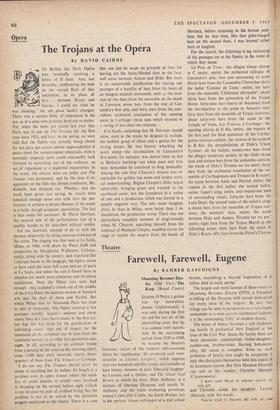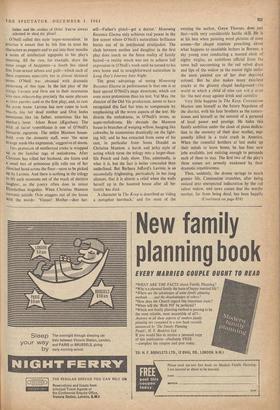Theatre
Farewell, Farewell, Eugene
By BAMBER GASCOIGNE Mourning Becomes Elec- tra. (Old Vic.)—The Keep. (Royal Court.) EUGENE O'NEn.L.'s genius Was for naturalistic drama. Unfortunately it was only during the first six and the last six of his playwriting years that he was content with natura- lism. In the interyening period, from 1920 to 1940, he became the theatre's foremost victim Of the modern self-conscious desire for 'significance.' He produced such mon- strosities as Lazarus Laughed, which requires over two hundred and fifty masks and includes at least twenty minutes of pure 'liberated laughter' by Lazarus and a chorus; and The Great God Brown in which the hero, Dion Anthony, is a mixture of libertine Dionysus and ascetic St. Anthony, and the warm mothering prostitute, named Cybel after Cybele, the Earth Mother, has in her parlour -cheap wall-paper of a dull yellow brown, resembling a blurred impression of a fallow field in early spring.'
The largest and most famous of these works is Mourning Becomes Electra (1931), a Freudian re-telling of the Oresteia with sexual motivation for every twist of the tragedy. By no%■ this trilogy can be seen in perspective as a vast empty monument to a once current intellectual fashion; it is the outstanding 'folly of modern drama.
The house of Atreus becomes a rich landown- ing family in puritanical New England at the time of the Civil War. Inside the family there are three incestuous relationships—father-daughter, mother-son, brother-sister. Barring homosexu- ality, the canon is complete. Even so, such profusion of family love might be acceptable if only the characters themselves were less aware of its incestuous nature. But Orin Mannon (Orestes) can sob to his mother, Christine Marmon (Clytemnestra): I don't want Hazel or anyone—you're my only girl and Christine scolds her daughter, Lavinia (Electra), with the words:
You've tried to become the wife of your
father and the mother of Orin! You've always schemed to steal my place!
O'Neill called this style 'super-naturalism.' In Practice it meant that he felt free to treat his characters as puppets and to put into their mouths a series of intellectual signposts to his play's meaning. All the men, for example, share the Same image of happiness—a South Sea island free from sexual taboos and guilt—which each of them expresses separately but in almost identical terms. O'Neill wit., obsessed with dramatic patterning of this type. In the last play of the II 'Ion I avinia and Orin use in their incestuous love-nate relationship precisely the same phrases ineir pareni used in the first play; and, to ram the point :tome. Lavinia has now .come to look exact!) likc her dead mother and Orin looks sometimes like his father, sometimes like his mother's lover Adam Brant (dEgisthus). The trick of facial resemblance is one of O'Neill's favourite signposts The entire Mannon house- hold even the domestic staff, wear 'the same strange mask-like expression,' suggestive of doom.
Fnispi orusam of intellectual tricks is wrapped Up in the fanidiar rags of melodrama. After Christine has killed her husband, she faints and a small box of poisonous pills rolls out of her Clenched hand across the floor—soon to be picked 1113 by Lavinia. And there is nothing in the trilogy to lift such moments out of the reach of derisive laughter, as the poetry often does in minor Elizabethan tragedies. When Christine Mannon commits suicide. Ofin staggers out of the house With the words: 'Vinnie! Mother—shot her- self—Father's pistol—get a doctor.' Mourning Becomes Electra only achieves real power in the few scenes where O'Neill's naturalistic brilliance bursts out of its intellectual straitjacket. The clash between mother and daughter in the first play does touch on the fierce reality of family hatred—a reality which was not to achieve full expression in O'Neill's work until he turned to his own home and to straightforward naturalism in Long Day's Journey Into Night.
The great advantage of seeing Mourning Becomes Electra in performance is that one is at least spared O'Neill's stage directions, which are even more pretentious than his text. Val May. the director of the Old Vic production, seems to have recognised this fact but tries to compensate by emphasising all the worst aspects of the text. He directs the melodrama, in O'Neill's terms, as super-melodrama. He shrouds the Mannon house in branches of weeping willow, hanging like cobwebs; he economises drastically on the light- ing bill; and he has extracted from some of his cast, in particular from Sonia Dresdel as Christine Mannon, a harsh and jerky style of acting which turns the trilogy into a larger-than- life Punch and Judy show. This, admittedly, is what it is, but the fact is better concealed than underlined. But Barbara Jefford's Lavinia is so successfully frightening, particularly in her long silences, that it is almost a relief when she walls herself up in the haunted house after all her family has died.
A character in The Keep is described as 'riding a metaphor bareback,' and for most of the evening the author, Gwyn Thomas, does just that—with very considerable bardic skill. He is at his best when painting word pictures of zany scenes—the chapel minister preaching about what happens to insatiable lechers in Borneo, a shy young man conducting a massed choir of eighty virgins, an ambitious official from the town hall succumbing to the red velvet dress and lips of the widow in the manor right under the stern painted eye of her dear departed colonel. But he also makes many excellent cracks at the gloomy chapel background—the world in which a child of nine can win a prize for 'the best essay against drink and carnality Very little happens in The Keep. Constantine Morton sees himself as the future Napoleon of the district, with his four brothers as the corner- stones and himself as the summit of a pyramid of local power and prestige. He hides this family ambition under the cloak of pious dedica- tion to the memory of their dear mother, sup- posedly killed in a train crash in America. When the resentful brothers at last make up their minds to leave home, he has four new jobs available, just enticing enough to persuade each of them to stay. The first two of the play's three scenes are severely weakened by their dramatic repetitiveness.
Then, suddenly, the drama springs to much greater life. Constantine crumbles, after being enticed into unexpected indiscretion by the red Velvet widow, and news comes that the worthy mother, far from being dead, has been happily
(Continued on page 824)
touring America in a cabaret act with her first lover. The pall of piosity and ambition lifts from the family, and in a magnificent final scene Gwyn Thomas combines humour, senti- ment and serious protest against the dark forces of puritanism. Mervyn Johns is splendidly funny as the old father, and Denys Graham as the most ineffectual of his sons. And the play is beautifully set by Ken Calder in an unending vista of grey, identical houses.








































 Previous page
Previous page